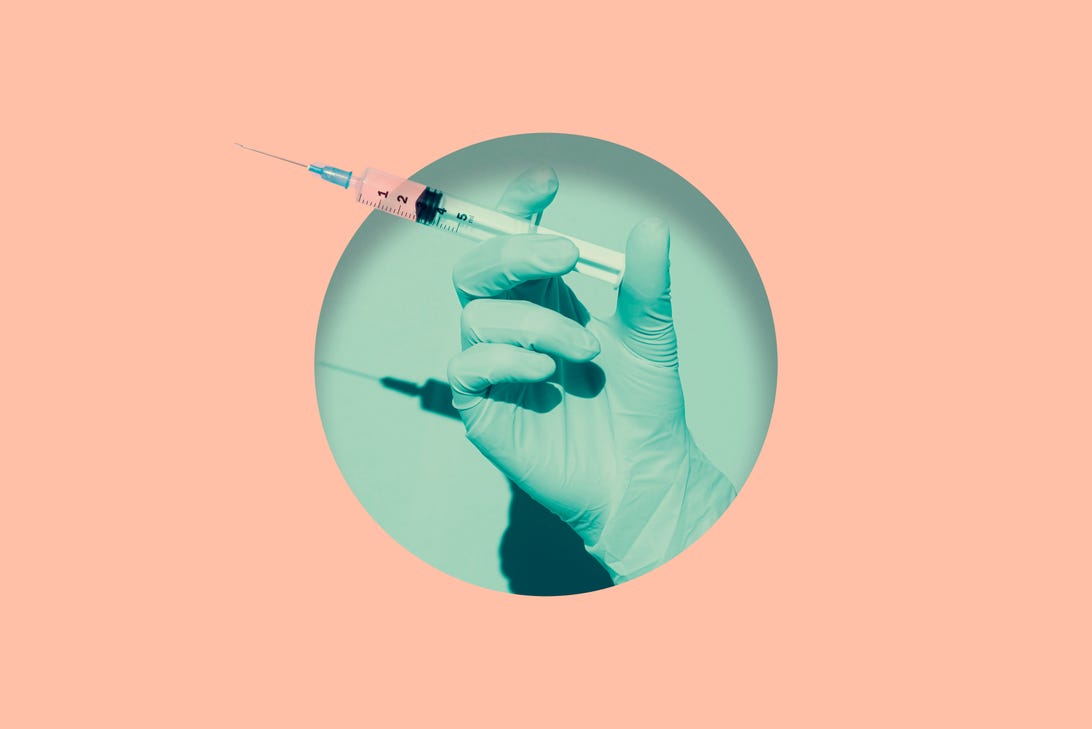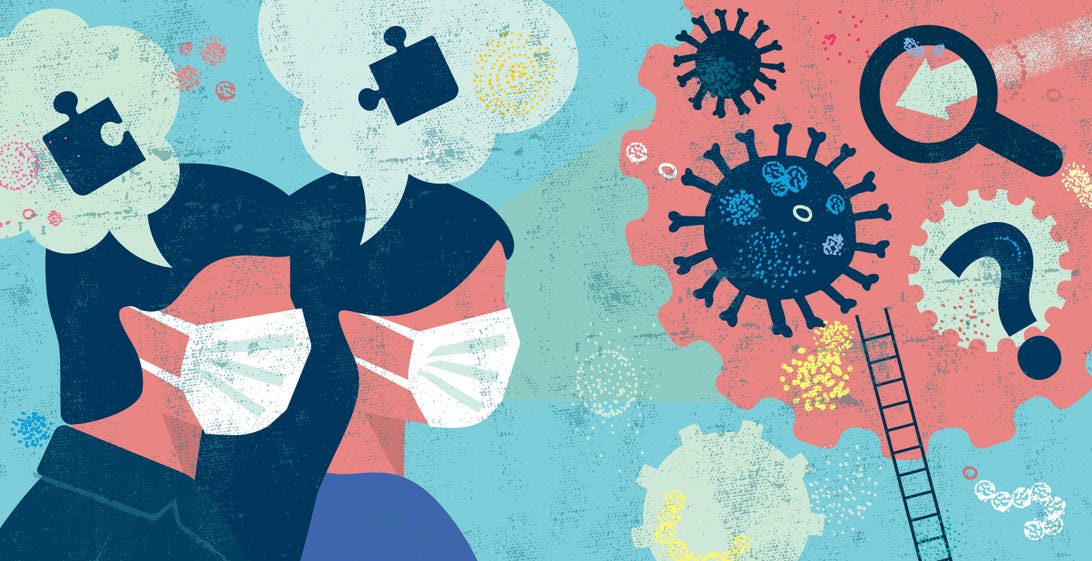
If you’ve heard murmurs linking COVID-19 vaccines and infertility, you aren’t alone. At the start of the pandemic, a blog post falsely claimed that the antibody response spurred to fight COVID-19 after vaccination would also fight off the formation of a protein essential to placenta formation, leading to early pregnancy loss.
Not only have researchers debunked the claim, proving that the antibodies that target the spike protein on the SARS-CoV-2 virus aren’t similar enough to the protein required for pregnancy, but there have also been no differences in pregnancy success between women who have antibodies against COVID-19 from natural infection, those who have antibodies from vaccination and those who don’t have any. (There is, however, increasing evidence that getting sick with COVID-19 while pregnant puts you at increased risk for hospitalization, preterm birth, stillbirth and damage to the placenta.)
So why the confusion? Aside from a misinformation campaign against COVID-19 vaccines, pregnant people have historically been excluded from medical studies, and the initial COVID-19 vaccine trials were no exception — leading to a lack of clear data earlier in the pandemic. Plus, anecdotal stories about how the COVID vaccines affect menstrual cycles caused even more panic and skepticism.
Here’s what researchers say now about fertility, COVID-19 and the vaccines, and why your period might be slightly late the month after you’re vaccinated.
Do COVID vaccines make it harder to get pregnant?
No, according to a February statement from the American College of Obstetricians and Gynecologists, the American Society for Reproductive Medicine (ASRM) and the Society for Maternal-Fetal Medicine. COVID-19 vaccines are encouraged for people who are already pregnant and those who might want to be in the future.
The US Centers for Disease Control and Prevention says there’s currently “no evidence” that any vaccine, including ones for COVID-19, causes fertility problems for either men or women.
Here’s research to back up the agencies’ claim: One study published in the Lancet looked at people who got pregnant while participating in trials for AstraZeneca’s vaccine (a similar vaccine to Johnson & Johnson’s). The researchers found no differences in pregnancy rates or fertility between those who received the COVID-19 vaccine versus the placebo, and also no difference in miscarriage rates.
Another study published in BioMed Central looked at 36 couples actively trying to conceive using in vitro fertilization (IVF). While noting (like many studies on COVID-19) that larger studies should be done to confirm, researchers wrote: “mRNA SARS-CoV-2 vaccine did not affect patients’ performance or ovarian reserve in their immediate subsequent IVF cycle.”
But having data that confirms both accidental and planned pregnancies continue to occur in equal numbers, regardless of vaccination status, might ease the initial hesitation around the “new” mRNA technology used in Pfizer and Moderna’s COVID vaccines.
“mRNA, specifically, is what people seem to be worried about,” Dr. Danielle Jones, an OB-GYN who makes videos debunking COVID-19 myths, said in one video. “mRNA is degraded within your body within hours to days and certainly is gone within a couple of weeks, and all that remains is your body’s response, meaning antibodies, to protect you against COVID-19.”


The novelty and urgency of the pandemic’s wide-ranging effects have led to a lot of questions about individual health.
DrAfter123/Getty ImagesDoes getting COVID make it harder to get pregnant?
It depends, current research says. One study in the American Journal of Epidemiology, which looked at heterosexual couples trying to get “spontaneously” pregnant, found that a woman getting sick with COVID-19 didn’t impact a couple’s chance of conceiving, but a male partner’s recent bout with COVID-19 did temporarily lower a couple’s chances.
Although researchers believe it’s short-term, couples who were trying to conceive had a slightly lower chance (about 18% less likely) of getting pregnant if the male partner had COVID-19 within 60 days of the reported menstrual cycle period. After 60 days had passed since the partner’s COVID-19 infection, there weren’t any fertility differences. Women who were tracking their menstrual cycles reported their partner’s medical history and vaccination status in the study.
A smaller semen analysis study has also linked COVID-19 illness with poor sperm quality and similar issues, but researchers from that study noted that participants’ semen quality prior to COVID-19 was unknown.
The CDC says that fever from illness can lead to a short-term decrease in sperm in otherwise healthy men. “Other possible reasons for a decline in fertility among male partners who recently tested positive could be inflammation in the testes and nearby tissues and erectile dysfunction, all common after SARS-CoV-2 infection,” the National Institutes of Health reported on the Journal of Epidemiology study. “The researchers noted that this short-term decline in male fertility could potentially be avoided by vaccination.”
But what about sperm and the COVID-19 vaccines? One small semen analysis study didn’t find a significant difference in the sperm quality of participants before and after two doses of Pfizer or Moderna’s vaccines. Participants actually had an increased sperm parameter (more sperm) after vaccination, but researchers attributed it to other factors of the study. The larger cohort study also didn’t find a difference in fertility between unvaccinated and vaccinated men.
Can the vaccine affect your period?
Once COVID-19 vaccines started rolling out to the masses (the biggest vaccine campaign of most people’s lifetimes), some people noted that their periods were a little different after they got their shots. Then a January study published in the Obstetrics and Gynecology Journal confirmed what many people already knew: Getting vaccinated can temporarily delay your period.
According to the study, someone with a regular cycle with an average length (24 to 38 days) was delayed by about a day. Most people’s periods returned to normal in one to two months.
But will that make you infertile? No. “I want to make sure we dissuade people from those untrue myths out there about fertility effects,” Dr. Hugh Taylor, the chair of the department of obstetrics, gynecology and reproductive sciences at Yale School of Medicine told the New York Times. “A cycle or two where periods are thrown off may be annoying, but it’s not going to be harmful in a medical way.”
COVID-19 itself and other illnesses can also affect people’s menstrual cycles, as illness can have a similar impact on necessary hormonal fluctuations as stress, heavy exercise and other factors.
The information contained in this article is for educational and informational purposes only and is not intended as health or medical advice. Always consult a physician or other qualified health provider regarding any questions you may have about a medical condition or health objectives.

